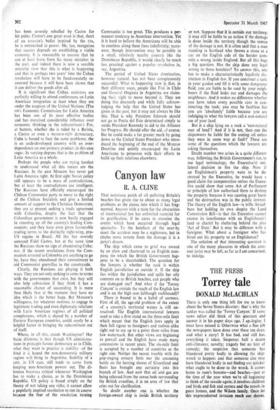Canyon law
R. A. CLINE
That notorious patCh of oil polluting Britain's beaches has given rise to about as many legal problems as the pieces into which it has frag- mented. Anyone with a taste for the obscurities of international law has unlimited material for its gratification, if he cares to examine the events which have occurred through legal spectacles. To the hoteliers of the near-by coast the accident may be a nightmare, but in circles more remote from the damage it is a jurist's dream.
The ship which came to grief was owned by an alien and chartered to an English com- pany (in which the British Government hap- pens to be a shareholder). The question for the lawyers is whether the rock is within English jurisdiction or outside it. If the ship lies within the jurisdiction and spills her oily contents on to British beaches, can people who are damaged sue? And what if the Torrey Canyon' is outside the reach of the English law and is on the high seas (although rockbound)?
There is bound to be a babel of answers. First of all, the age-old problem of the extent of a country's territorial waters is still un- resolved. The English international lawyers used to take a firm stand on the three-mile limit which meant that the English laws apply in their full rigour to foreigners and natives alike right out to sea up to a point three miles from low watermark. But other views are beginning to prevail and the English have made many concessions in recent years. The six-mile limit is accepted by a number of countries as the right one. Neither the recent trouble with the pop-singing estuary forts nor the unceasing battle on the herring shores of Greenland and fleets has brought any certainty into this branch of law. And now that oil and gas are being released from the ocean beds surrounding the British coastline, it is an area of law that cries out for clarification.
So doubt number one is whether the foreign-owned ship is inside British territory
or not. Suppose that it is outside our territory; it may still be liable to an action if the damage is done inside the territory though the source of the damage is not. It is often said that a man standing in Scotland who throws a stone at a car on the English side of the border com- mits a wrong inside England. But all this begs a big question. Has the ship done any legal wrong to those hoteliers? To answer this, one has to make a characteristically legalistic dis- tinction in English law. If you construct a tank in your garden and fill it with some dangerous fluid, you are liable to be sued by your neigh- bours if the fluid leaks out and damages the neighbours. And it makes no difference whether you have taken every possible care in con- structing the tank; you may be faultless but you are 'absolutely' liable because you are indulging in what the lawyers call a non-natural use of your land.
But is a ship lying on a rock a 'non-natural user of land'? And if it is not, then can the shipowners be liable for the oozing oil unless they were in some way at fault? These are some of the questions which the lawyers are asking themselves.
Doubt number two arises in a quite different way, following, the British Government's (or, to use legal terminology, the Executive's) uni- lateral decision to fire the ship. Now if an Englishman's property were to be de- stroyed by the Executive, he would have a good claim for compensation unless the Execu- tive could show that some Act of Parliament or principle of law authorised them to destroy the property because it was causing great harm and the destruction was in the public interest.
The theory of the English law—a trifle thread- bare but holding its own despite the Land Commission Bill—is that the Executive cannot excuse its interference with an Englishman's land or chattel by sheltering behind the plea `Act of State.' But it may be different with a foreigner. What about a foreigner who has hired out his property to an Englishman?
The solution of that interesting question is one of the many pleasures in which the ama- teur jurist may be left, as far as I am concerned, to indulge.






























 Previous page
Previous page